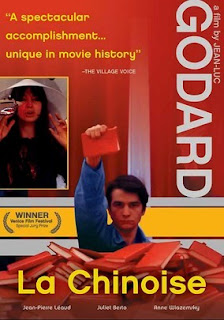La Chinoise
Godard's 1967 film, La Chinoise, of all his films, fits the zeitgeist of '60s revolutionary thought most accurately. It seems incredibly dated today--are there any Maoists left in the West?--and thus is more a curiosity than a good movie. Most of it is simply sloganeering, but does have a vibrant color palette.
The film concerns a cel of revolutionaries in Paris who speak in slogans, listen to Radio Peking, and idly speculate about mass murder. Jean-Pierre Leaud is an actor and vocal participant. It's as if his character from Masculin Feminin quit trying to get laid and seriously took up the cause. He is involved with Anne Wiazemsky, the most serious-minded of the group (the actress would become Godard's wife). There is also a young woman (Juliet Berto) who had been a prostitute, a Russian (Lex de Bruijin) and a bookish young man who is kicked out of the group for, among others, expressing admiration for an American movie (Johnny Guitar).
It's hard to tell if Godard is in sympathy with the revolutionaries are mocking them. A long scene toward the end has Wiazemsky on a train debating Francis Jeanson, real-life philosopher and revolutionary during the Algerian conflict. She suggests closing the universities, and if students and professors don't stop going they should be bombed. He tells her violence is not the answer (Leaud says that the two qualities necessary in a revolutionary are "sincerity and violence") and wonders if she knows what to do after the violence. It made me think of John Lennon's "Revolution"--"When you talk about destruction, don't you know that you can count me out."
The film is beautiful, though. Working with Raoul Coutard, the film makes especially good use of red, as one might expect in a movie about Red China. The revolutionaries wall themselves inside forts made of Mao's Little Red Book. One image that sticks me with me is a corruption of an Esso ad, with the tiger-in-the-tank, but the word "napalm" is put on the gas tank. Berto stands nearby, wearing an Asian conical hat, is under attack by U.S. bombers suspended on strings.
The film ends with a comically disastrous attempt by Wiazemsky attempting to assassinate a Russian official. It further reinforces the idea that Godard doesn't particularly think that Maoists are the answer to American influence in the world.
The film concerns a cel of revolutionaries in Paris who speak in slogans, listen to Radio Peking, and idly speculate about mass murder. Jean-Pierre Leaud is an actor and vocal participant. It's as if his character from Masculin Feminin quit trying to get laid and seriously took up the cause. He is involved with Anne Wiazemsky, the most serious-minded of the group (the actress would become Godard's wife). There is also a young woman (Juliet Berto) who had been a prostitute, a Russian (Lex de Bruijin) and a bookish young man who is kicked out of the group for, among others, expressing admiration for an American movie (Johnny Guitar).
It's hard to tell if Godard is in sympathy with the revolutionaries are mocking them. A long scene toward the end has Wiazemsky on a train debating Francis Jeanson, real-life philosopher and revolutionary during the Algerian conflict. She suggests closing the universities, and if students and professors don't stop going they should be bombed. He tells her violence is not the answer (Leaud says that the two qualities necessary in a revolutionary are "sincerity and violence") and wonders if she knows what to do after the violence. It made me think of John Lennon's "Revolution"--"When you talk about destruction, don't you know that you can count me out."
The film is beautiful, though. Working with Raoul Coutard, the film makes especially good use of red, as one might expect in a movie about Red China. The revolutionaries wall themselves inside forts made of Mao's Little Red Book. One image that sticks me with me is a corruption of an Esso ad, with the tiger-in-the-tank, but the word "napalm" is put on the gas tank. Berto stands nearby, wearing an Asian conical hat, is under attack by U.S. bombers suspended on strings.
The film ends with a comically disastrous attempt by Wiazemsky attempting to assassinate a Russian official. It further reinforces the idea that Godard doesn't particularly think that Maoists are the answer to American influence in the world.



Comments
Post a Comment